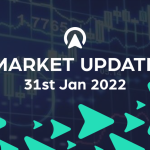
Euro
After an impressive rally against the dollar, the Euro faces bearish pressure this week. A hawkish change of tone from the European Central Bank pushed the Euro nearly 1.7% higher on Thursday. However, it reversed on Friday after positive Nonfarm Payroll figures from the U.S., setting the groundwork for faster interest rate hikes from the Federal Reverse.
This week bulls will defend the 1.14 level and target 1.18 as more hawkish comments from ECB Governing Council member Klaas Knot suggest a rate increase in Q4 whilst talks of potentially two hikes circulate.
High-impact data comes in the form of a speech from ECB’s President Lagarde speech on Monday, where any further hawkish comments regarding policy change could boost the Euro further. On Friday, German CPI data will be released for January. We expect this to be weak but have little impact unless there is a significant deviation from the consensus.
Dollar
The robust labour data from the U.S. stopped the dollar from losing any further ground against the Euro late last week. Nonfarm Payrolls rose significantly for Jan, and Dec revised figures also showed growth.
CPI data on Thursday will have the most significant impact this week. In January, inflation may hit new eye-watering highs of 7.3% and core inflation at 5.9%. These highs will set the stage for a significant hike from the Fed this March and initiate a reenergized run for the dollar. But the markets may be unmoved as we get closer to peak inflation and data has little effect.
Externally, positive moves to resolve the Russian / Ukraine standoff will favour the dollar upside if the conflict is avoided.
GBP
Last Thursday, GBP rallied after the Bank of England confirmed a 0.25pt interest rate hike. A 0.5pt increase was narrowly missed with a split vote of 5/4, signalling a very hawkish mood from the BoE.
BoE governor Andrew Bailey came under fire for his comments regarding stalling wage increases to help stall inflation. His remarks diverge from the Prime Ministers efforts to create a high wage economy in the face of rising energy and consumer prices. Bailey may attempt to clarify his comments this week to squash press and media headlines.
On Friday, we will see GDP figures for Q4, and a fall would technically put the U.K. in a recession but will be seen as transitionary, with Q1 statistics expected to show growth.



